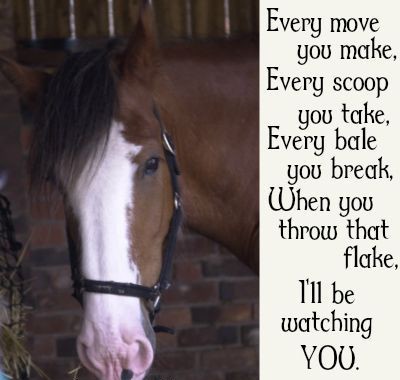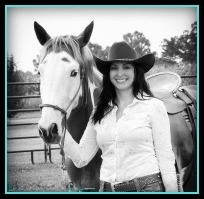
Sting may have written it about an obsessed lover, but you can bet your horse is definitely keeping a close eye and ear on you whenever you’re in his vicinity. In the wild, a horse’s survival can depend on how observant they are and how quickly they react to whatever is happening; our modern horses have just retained and adapted this very heightened sense of observation.
How often have you heard someone say, “I’m afraid of horses and they know it”? When you see this person anywhere near a horse they tend to hang back, making themselves very small. They take tentative steps toward the horse in front of them, fearfully extending a hand and withdrawing it rapidly. To a horse, this looks like an animal they can easily dominate that has the same annoying habits those pesky insects have, flying in and buzzing off again. So naturally, some horses will pin their ears and show a little irritation.
The real key to dealing with horses as in so much of life is focus and confidence. To be a good horseman or horsewomen you must focus on the horse. For many people this is what attracts them to horses in the first place (whether they realize it or not). Focusing totally on the horse forces you to live in the moment and forget everything else. The pressure of our constantly connected world makes this very hard to do, but with horses it’s necessary. This is not only helpful to the horse but to the human as well. How often have you seen someone leading a horse while having an animated conversation via Bluetooth? To be truly successful with horses you can’t talk or text or email while riding but instead you must pay close attention to what your own body language is conveying to the horse at the end of the reins or lead rope.
This means your frustration at work, your relationship problems, or the shortage of funds you’re currently experiencing, all goes out the window as your focus shifts to your horse instead of yourself. Simply by changing this focus you can immediately reduce some of the tension in your body. Then If your demeanor is relaxed and confident, your voice low and steady and your touch soft and sure, even the most fearful horse will relax a little. If you convey the idea that you know what you want and by doing what you want they will not get into any trouble; and may even enjoy the experience, you will go a long way toward gaining a horse’s trust.
And trust is what it’s all about. How you hold yourself, the speed at which you move, even whether you avoid or engage in eye contact can either convince a horse you’re a leader that is safe to follow or that you’re just as unsure as they are. When you’re working with your horse remember it’s just as if you’re dancing together; in the partnership you’re the one who needs to have the confidence of Gene Kelly. By being relaxed but definite about the direction you want the dance to take, you may find you’ll be surprised by the levels even an unsure dancer can achieve.

 Michelle Kuester has a bachelors degree in equine science and over twenty years of experience working with horses. She is passionate about natural horsemanship and helping people gain the best possible relationship with their equine companions.
Michelle Kuester has a bachelors degree in equine science and over twenty years of experience working with horses. She is passionate about natural horsemanship and helping people gain the best possible relationship with their equine companions.